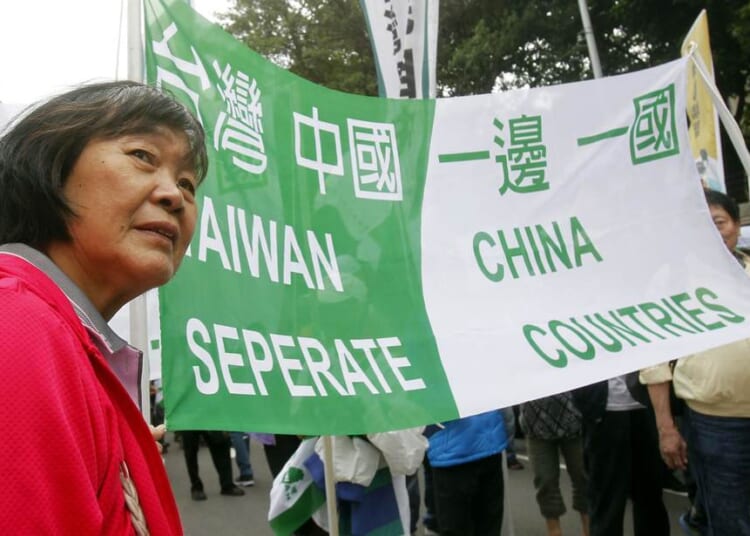Taiwan just said no to “reunification” or you could argue that Taiwan just said yes to war.
China has been making threats for weeks that this election was a vote between peace and war. Peace on China’s terms meant electing the Beijing-friendly KMT Party so that reunification with the mainland could be negotiated. War, according to China, meant electing the DPP to a third term in a row by voting for William Lai. Officially, Lai has said he is happy with the status quo but China knows he’s the most pro-independence candidate in the race. Today William Lai was elected president of Taiwan.
Taiwanese voters have chosen William Lai as their president in a historic election, cementing a path that is increasingly divergent from China…
By winning an unprecedented third consecutive presidential term for his party, Mr Lai has broken new ground. In his first remarks after his opponents conceded, he signalled that this was an irreversible trajectory.
“The country will continue to walk the right path forward. We will not look backwards,” he told the world’s media in a press conference.
CNN has more on a big moment for democracy in Taiwan:
“This is a night that belongs to Taiwan. We managed to keep Taiwan on the map of the world,” Lai told thousands of jubilant supporters at a rally after his win.
“The election has shown the world the commitment of the Taiwanese people to democracy, which I hope China can understand,” he added.
At a celebration event after the results were announced Lai said, “Between democracy and authoritarianism, we choose to stand on the side of democracy,” And you can bet that didn’t go down well in China.
But as much as China has built this up as a potential last straw toward war, the reality is that nothing much has changed. The DPP is the same party that won the last two elections and during that time, no one announced Taiwan’s independence from the mainland. William Lai won’t be doing that either.
Mr. Lai is not the reckless firebrand that Beijing has depicted, say Taiwanese politicians who know him; nor is war over Taiwan imminent or inevitable, say many officials and experts. Mr. Lai campaigned on a theme of continuity with the policies of Ms. Tsai, who has sought to build up Taiwan’s military defenses and deepen relations with the United States and other democracies, while avoiding a total rupture with China.
But even if Mr. Lai sticks faithfully to that course, he may face a searing test of his political and diplomatic skills to keep Taiwan secure and united against deepening pressure from China. Mr. Lai will be Taiwan’s president during a time when, some U.S. officials have warned, China will be increasingly ready to try to seize or subdue Taiwan, which it sees as its lost territory, by armed force.
In its first response to Mr. Lai’s victory, the Chinese government office for Taiwan affairs said the election outcome showed that the “Democratic Progressive Party does not represent mainstream opinion on the island,” the official Xinhua news agency reported. The statement indicated that Beijing would reach out to other Taiwanese political parties and groups, as it already does, “to encourage cross-strait exchanges and cooperation.”
So what is coming? No one knows for sure. China has been using warplanes to make a show of force toward the island almost constantly since Joe Biden took office. Those flights are intended to imitate what might happen in an invasion, but most observers say China doesn’t have the ability to pull that off yet. Most obvservers think China will instead turn to economic warfare. As Taiwan’s number one trading partner, they have the ability to cripple the island’s economy fairly quickly if they want to. That might make the DPP party very unpopular and make playing nice with China a much higher priority in the next election. We’ll have to wait and see. Only one thing is certain, China is not going to forget.
Today the People’s Daily published a piece that seems like it’s meant to lay groundwork for whatever comes next. Step one: Make sure the US isn’t ready to do to you what you’re trying to do to Taiwan.
A Chinese foreign ministry spokesperson on Friday said that China hopes the United States will honor commitments, handle Taiwan-related issues prudently and properly, and refrain from interfering in the elections of the Taiwan region in any form.
It is reported that recently the National Security Council of the White House held a press call on Taiwan elections via teleconference. An anonymous official from the White House said that the United States is committed to the one-China policy, does not support “Taiwan independence” and supports cross-Strait dialogue. The official added that the United States does not take a position on the ultimate resolution of cross-Strait differences, provided they are resolved peacefully.
In response to a related query, spokesperson Mao Ning told a daily news briefing that China noted the remarks of the U.S. official. The one-China principle is a prevailing international consensus and the political foundation of the China-U.S. relationship. “Taiwan independence” is the biggest threat to cross-Strait peace and stability and is doomed to failure.
Taiwan’s independence may in fact be doomed to failure but they shouldn’t give it up without a fight. Today’s election is a clear sign they haven’t given up yet.

